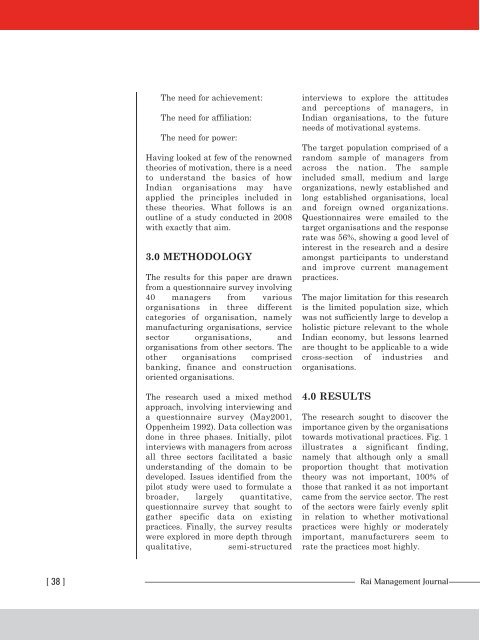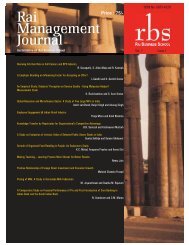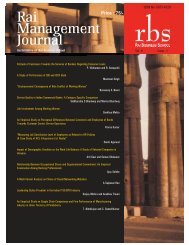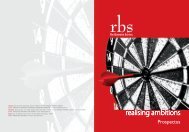ISSN No - RBS
ISSN No - RBS
ISSN No - RBS
Create successful ePaper yourself
Turn your PDF publications into a flip-book with our unique Google optimized e-Paper software.
The need for achievement:The need for affiliation:The need for power:Having looked at few of the renownedtheories of motivation, there is a needto understand the basics of howIndian organisations may haveapplied the principles included inthese theories. What follows is anoutline of a study conducted in 2008with exactly that aim.3.0 METHODOLOGYThe results for this paper are drawnfrom a questionnaire survey involving40 managers from variousorganisations in three differentcategories of organisation, namelymanufacturing organisations, servicesector organisations, andorganisations from other sectors. Theother organisations comprisedbanking, finance and constructionoriented organisations.The research used a mixed methodapproach, involving interviewing anda questionnaire survey (May2001,Oppenheim 1992). Data collection wasdone in three phases. Initially, pilotinterviews with managers from acrossall three sectors facilitated a basicunderstanding of the domain to bedeveloped. Issues identified from thepilot study were used to formulate abroader, largely quantitative,questionnaire survey that sought togather specific data on existingpractices. Finally, the survey resultswere explored in more depth throughqualitative, semi-structuredinterviews to explore the attitudesand perceptions of managers, inIndian organisations, to the futureneeds of motivational systems.The target population comprised of arandom sample of managers fromacross the nation. The sampleincluded small, medium and largeorganizations, newly established andlong established organisations, localand foreign owned organizations.Questionnaires were emailed to thetarget organisations and the responserate was 56%, showing a good level ofinterest in the research and a desireamongst participants to understandand improve current managementpractices.The major limitation for this researchis the limited population size, whichwas not sufficiently large to develop aholistic picture relevant to the wholeIndian economy, but lessons learnedare thought to be applicable to a widecross-section of industries andorganisations.4.0 RESULTSThe research sought to discover theimportance given by the organisationstowards motivational practices. Fig. 1illustrates a significant finding,namely that although only a smallproportion thought that motivationtheory was not important, 100% ofthose that ranked it as not importantcame from the service sector. The restof the sectors were fairly evenly splitin relation to whether motivationalpractices were highly or moderatelyimportant, manufacturers seem torate the practices most highly.[ 38 ] Rai Management Journal





